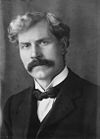- Christopher Thomson, 1st Baron Thomson
-
The Right Honourable
The Lord Thomson
PCSecretary of State for Air In office
22 January 1924 – 3 November 1924Monarch George V Prime Minister Ramsay MacDonald Preceded by Sir Samuel Hoare, Bt Succeeded by Sir Samuel Hoare, Bt In office
7 June 1929 – 5 October 1930Monarch George V Prime Minister Ramsay MacDonald Preceded by Sir Samuel Hoare, Bt Succeeded by The Lord Amulree Personal details Born 13 April 1875
Nasik, British IndiaDied 5 October 1930
FranceNationality British Political party Labour Christopher Birdwood Thomson, 1st Baron Thomson PC (13 April 1875 - 5 October 1930) was a British Army officer who went on to serve as a Labour minister and peer. He served as Secretary of State for Air under Ramsay MacDonald in 1924 and between 1929 and 1930, when he was killed in the R101 disaster.
Contents
Early life
Born in Nasik (now Nashik) in the Bombay Presidency of India to a military family, Thomson attended Cheltenham College. His father was Major-General David Thompson, Royal Engineers, and his mother was the daughter of Major-General Christopher Birdwood; William Birdwood, 1st Baron Birdwood was another grandson of Major-General Birdwood.[citation needed]
Career
Military
After graduating from Sandhurst in 1894, Thomson joined the Royal Engineers. He served first in Mauritius and then saw action during the Second Boer War (1899-1902), where he was detailed to help with the RE Balloon Section outside Kimberley.[citation needed]
In World War I he first served at the British Expeditionary Force Headquarters, and was Chief Military Interpreter between Sir John French and General Joffre. In 1915 Thomson, a fluent French speaker, was sent to Bucharest as military attaché on Kitchener's initiative to bring Romania into the war. But when there he quickly formed the view that an unprepared and ill-armed Romania facing a war on three fronts against Austria-Hungary, Turkey and Bulgaria would be a liability not an asset to the allies. This view was brushed aside by Whitehall, and he signed a Military Convention with Romania on 13 August 1916. By the end of 1916 he had to alleviate the consequences of Romania's capitulation, and he supervised the destruction of the Romanian oil wells to deny them to Germany.[1]
After a distinguished wartime career both behind and in front of the lines, most famously at Jericho in the Palestine Campaign, Thomson formed part of the British delegation at the Versailles conference, but condemned the Versailles terms as containing the seeds of another war. As in Romania where he followed a policy (of making Romania an ally) that he did not agree with, he found both experiences profoundly negative.[citation needed]
Politics
After Versailles Thomson made the decision to enter politics, and joined the Labour Party and Fabian Society. He stood as Labour candidate in two Tory strongholds, Bristol Central in 1922 and St Albans in 1923, but failed to win either seat.[citation needed] In 1924, however, newly elected Labour Prime Minister Ramsay Macdonald elevated him to the peerage as Baron Thomson, of Cardington in the County of Bedford.[2] He was sworn of the Privy Council at the same time.[3] He served as Secretary of State for Air in Macdonald's first short lived Labour administration of 1924[4] - interrupting briefly Sir Samuel Hoare's seven year grip on the post. The fall of the government meant that it was not until 1929 that he regained the position, once again serving under Macdonald.[5] In the interim he had maintained his air interests acting as chairman of the Royal Aeronautical Society and the Royal Aero Club, and patron of the Air League.[citation needed]
Private life
Thomson was known as Kit to his family and C. B. to his friends. In March 1915 while British military attache in Bucharest, he met the (married) French-Romanian author Princess Marthe Bibesco, and remained devoted to her for the rest of his life. They corresponded regularly. She dedicated four books to "C.B.T." and visited the site of the R101 accident with their mutual friend the Abbé Mugnier in December 1930.[6]
Death
His second term in office was cut short by tragedy as Thomson died in the crash of the R101 airship, a government designed dirigible, on its maiden flight to Karachi in October 1930. The accident claimed the lives of almost 50 and caused the cancellation of the British airship programme by Thomson's successor as air minister Lord Amulree. It was Thomson himself who had initiated the programme in 1924 and he who had rushed through the development of the R101: the privately (Vickers) built R100 was demonstrably more reliable. Thomson's vision of a uniquely British form of intercontinental passenger travel would only be realised by subsequent Labour governments' development of the Concorde.[citation needed]
References
- ^ To Ride the Storm: The Story of the Airship R.101 by Sir Peter G. Masefield, pages 15-17 (1982, William Kimber, London) ISBN 0-7183-0068-8
- ^ London Gazette: no. 32907. p. 1265. 12 February 1924.
- ^ London Gazette: no. 32901. p. 769. 25 January 1924.
- ^ London Gazette: no. 32901. p. 770. 25 January 1924.
- ^ London Gazette: no. 33505. p. 3856. 11 June 1929.
- ^ Masefield, pages 18-20, 36, 415
Political offices Preceded by
Sir Samuel Hoare, BtSecretary of State for Air
1924Succeeded by
Sir Samuel Hoare, BtPreceded by
Sir Samuel Hoare, BtSecretary of State for Air
1929–1930Succeeded by
The Lord AmulreePeerage of the United Kingdom New creation Baron Thomson
1924 – 1930Extinct Categories:- 1875 births
- 1930 deaths
- Royal Engineers officers
- British Army personnel of the Second Boer War
- British Army personnel of World War I
- Barons in the Peerage of the United Kingdom
- Labour Party (UK) hereditary peers
- Victims of aviation accidents or incidents in France
- Members of the Privy Council of the United Kingdom
Wikimedia Foundation. 2010.

